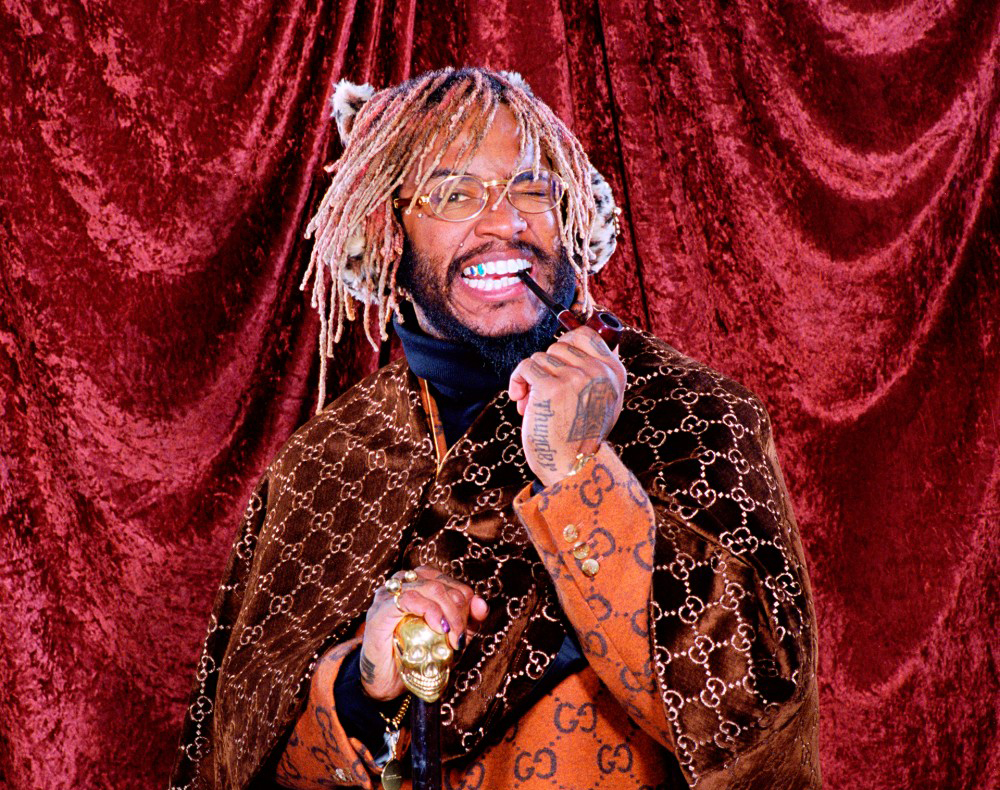Back to the Future with Thundercat

Landing on the fringes of modern jazz and R&B, the eclectic, eccentric bassist’s
latest LP is intrinsically tied to an entirely unpredictable era.
Thundercat’s music has alternately been described as the soundtrack to a moon landing and a banging house party. And, that dichotomy is just fine with the Grammy-winning bassist, singer, songwriter, producer and anime enthusiast.
For more than a decade, the musician—whose given name is Stephen Bruner—has slowly, but steadily, grown into one of the modern music world’s most respected bassists. He’s laid down memorable parts on tracks by Kendrick Lamar, Erykah Badu, Janelle Monae, Mac Miller and Childish Gambino; his in-house crew of collaborators includes saxophonist Kamasi Washington and iconic producer Flying Lotus. On his own albums, his freak flag flies free—absurdist lyrics are often mashed with deeply existential reflections, and frenetic, somersaulting bass runs are perfectly paired with gently flowing strings.
With It Is What It Is, Thundercat’s fourth LP, the Compton-born musician doubles down on every whim to create his most affecting, entertaining, heartbreaking and joyful record to date.
His art, he says, is “everything and nothing all at once. It’s a place where all these things meet.” The one unifying factor? The man himself, of course, and It Is What It Is lives comfortably on the fringes of modern jazz and R&B.
Thundercat was a child of the ‘80s and started studying bass at a young age. A prodigious player, he rarely put down his instrument.
“Nothing makes up for practicing,” he says. “Putting the time in is imperative. How do you know a person loves you? By their actions. Nothing can replace that time spent with your instrument.”
As a teenager, Thundercat joined the veteran thrash-punk band Suicidal Tendencies and, by the late 2000s, he’d garnered a reputation as a reliable session musician. Yet it was his work on Erykah Badu’s 2008 comeback, New Amerykah Part One, that really paved the way for the next stage of his career. Thundercat’s first two solo albums, 2011’s The Golden Age of Apocalypse and 2013’s Apocalypse were built on his wriggling, acrobatic basslines, and delicious swirl of spacey jazz and heavy-leaning funk. Then Kendrick came calling and Thundercat became an integral part of the rapper’s 2015 visionary classic, To Pimp a Butterfly.
His solo breakthrough arrived with 2017’s Drunk. The LP crystallized Thundercat’s vision—a reverence for the past that still sounded thoroughly futuristic. The bassist invited two of his musical heroes, Kenny Loggins and Michael McDonald, to collaborate on the sneakily funky “Show You the Way,” guest spots that helped introduce a sizable portion of his growing fanbase to the blue-eyed soul stars.
“They’re people who inspired me to create, and [the collaboration] stemmed from me wanting to show them appreciation in my life,” says Thundercat. “My mom would always say: ‘Give a person flowers while they’re here.’ Like, don’t let people die before you appreciate them. I took that to heart.”
His mother’s message never felt more poignant than in 2018, when rapper Mac Miller tragically died at 26. Miller and Thundercat had become “soul brothers” and collaborators, sharing an unquenchable musical curiosity that birthed some of Miller’s best songs. On Miller’s final album, 2019’s Circles—which was finished posthumously by producer Jon Brion and an army of friends—Thundercat can be heard on the last two tracks. Over a mesmerizing liquid bassline, Miller sings about a “place way above the clouds, somewhere in between later and right now.”
The experience made an indelible impression on Thundercat. “Mac changed my whole life,” he says. “You only get a few friends who you can call your best. He was somebody I’d trust my daughter with, someone who’d go to church with me. [Circles] is the Mac I knew. It’s a beautiful piece of art, a beautiful way to send off an amazing artist. It is what it is. Mac let you know it was OK to just be you.”
When Thundercat set out to work on It Is What It Is—with Flying Lotus as his executive producer and deeply entrenched collaborator—he offered flowers to another hero, R&B singer Steve Arrington. Together with Childish Gambino and guitarist Steve Lacy, they created “Black Qualls,” which would become the album’s electrifying, funky first single. Now, in 2020, the song has taken on a new life. It’s chorus is a resounding rallying cry: “There’s no more living in fear/ If we don’t talk about it, then who will?”
“That song is genuinely what’s happening right now,” says Thundercat. “We are in that moment. Exactly what he’s singing about is happening. So to create something with Steve that could last is insane.”
Thundercat couldn’t have known that It Is What It Is would be so intrinsically tied to 2020, but it’s impossible not to hear. The material is as playful and winkingly self-conscious as anything in Thundercat’s catalog—on “Dragonball Durag,” he proclaims in falsetto, “I may be covered in cat hair, but I still smell good”—but his reverence and introspection help balance the album. On the floating bassdaydream “Existential Dread,” Thundercat sings, “I’m not sure of what comes next, but I’ll be alright as long as I keep breathing.” And on the record’s slow-brewing, self-titled closer, his final words find him waving into the abyss: “Hey, Mac.”
For Thundercat, It Is What It Is was an exercise in patience, clarity and exploration. It finds congruity within a complex musician who flies around the universe.
“When you put my records on, that’s really who I am,” he says. “Music is a place where you find yourself; Flying Lotus taught me to always be honest in the music. You take your time with it and try not to get razzled. You let it move the way it moves. And you create with an open mind. You need to be open to whatever comes next. Because if you knew what came next, then you’re not really living right now.”




















